Salary increase letters are an important tool for employees looking to negotiate a raise with their employer. They allow employees to present their case for a salary increase in a clear and professional manner. In this article, we will discuss the key elements of a salary increase letter, including how to research and prepare for the conversation, how to make a compelling case for a raise, and how to follow up after the meeting.
Whether you’re a new employee or a long-time veteran, this guide will help you navigate the salary increase process and increase your chances of success.
Table of Contents
Salary Increase Letter Templates
Salary Increase Letter Templates are pre-designed formats used by employers or managers to communicate an increase in salary to an employee. These templates provide a structured framework for conveying the salary adjustment, including the details of the increase, effective date, and any accompanying information or expectations. Salary Increase Letter Templates ensure consistency, professionalism, and transparency in communicating salary changes to employees, fostering positive employee relations and aligning compensation with performance and market standards.
Salary Increase Letter Templates provide a structured and professional approach to communicating salary adjustments to employees. By using these templates, employers or managers can ensure consistency, transparency, and fairness in salary discussions. These templates foster positive employee relations, reinforce employee motivation and engagement, and help align compensation with performance and market standards. Salary Increase Letter Templates serve as valuable tools in recognizing employee contributions, promoting a culture of fairness and openness, and maintaining positive employee morale.
Who do you talk to about salary increase?

A salary increase letter should be addressed to the person who has the authority to approve or deny the request for a raise. This is typically the employee’s direct manager or supervisor. If the employee is unsure who the appropriate person is, they can ask their human resources department or the person they report to for guidance. It’s important to make sure the letter is addressed to the right person to increase the chances of it being read and considered.
Essential Elements to Include in Your Salary Increase Letter
When it comes to asking for a salary increase, one of the most effective ways to present your case is through a salary increase letter. This letter allows you to express your reasons for requesting a raise and provide evidence of your qualifications and contributions to the company.
However, it’s important to note that crafting a salary increase letter is not a one-size-fits-all process, and it’s essential to tailor it to your specific circumstances. In this article, we will discuss the essential elements that should be included in your salary increase letter to increase your chances of success.
A clear and specific request: The first and most important element of your salary increase letter is a clear and specific request for a raise. Be sure to state the amount of the raise you are requesting and the reasons why you believe you deserve it. Be specific about the amount and the reasons, as this will make it easier for your employer to understand your request and to make a decision.
Evidence of your qualifications and contributions: The second essential element of your salary increase letter is evidence of your qualifications and contributions to the company. This can include information such as your job performance, accomplishments, and any additional responsibilities you have taken on. Be sure to provide specific examples and statistics to support your claims.
Market research: The third essential element of your salary increase letter is market research. It’s important to research the average salary for your position and industry. This information will help you make a compelling case for your raise by showing that your current salary is below the industry average.
Timing: The fourth essential element of your salary increase letter is timing. It’s important to consider the timing of your request, as the timing can have a significant impact on the outcome. For example, if the company is experiencing financial difficulties, it may not be the best time to ask for a raise. On the other hand, if the company is doing well, it may be more likely that your request will be granted.
A professional and courteous tone: The fifth essential element of your salary increase letter is a professional and courteous tone. It’s important to remember that your letter is a formal business communication and should be written in a professional and courteous manner. Avoid being confrontational or making demands. Instead, express your gratitude for the opportunity to work for the company and your desire to continue to contribute to its success.
Follow-up: The sixth and final essential element of your salary increase letter is follow-up. After you have submitted your letter, it’s important to follow up with your employer to check on the status of your request and to schedule a meeting to discuss it further. This shows that you are serious about your request and that you are willing to have an open and honest conversation about your salary.
What are the key strategies for effectively requesting a salary increase?
There are several key strategies that can be used when requesting a salary increase. These include:
Preparation: Research the average salary for your position and industry, as well as the company’s financial performance. Use this information to make a compelling case for your raise.
Timing: Consider the timing of your request and choose a time when the company is more likely to be in a position to grant a raise.
Communicate your achievements and contributions: Highlight your accomplishments, responsibilities, and contributions to the company. Provide specific examples and statistics to back up your claims.
Be professional and courteous: It’s important to remain professional and courteous throughout the process. Avoid being confrontational or making demands. Instead, express your gratitude for the opportunity to work for the company and your desire to continue to contribute to its success.
Be willing to negotiate: Be prepared to negotiate and be open to alternative solutions, such as additional benefits or opportunities for professional development.
Follow up: After you have submitted your request, follow up with your employer to check on the status of your request and to schedule a meeting to discuss it further.
Be ready for a “No” and be prepared to ask for feedback and if there are any specific things you can do to improve your chances of getting a raise in the future.
By following these key strategies, you can effectively communicate your case for a salary increase and increase your chances of success. Remember that the process of requesting a salary increase can take time and it’s important to stay persistent, professional, and respectful throughout the process.
How To Write A Salary Increase Letter
Writing a salary increase letter is an important step in requesting a raise from your employer. It allows you to present your case in a clear, professional manner and provides you with an opportunity to demonstrate your qualifications, achievements and contributions to the company. In this article, we will discuss the key elements of a salary increase letter and provide a step-by-step guide on how to write one.
Step 1: Research your market value and the company’s financial performance
Before writing your letter, it’s important to conduct research on the average salary for your position and industry, as well as the company’s financial performance. This information will help you make a compelling case for your raise by showing that your current salary is below the industry average or that the company is performing well enough financially to afford a raise.
Step 2: Gather evidence of your qualifications and contributions
The next step is to gather evidence of your qualifications and contributions to the company. This can include information such as your job performance, accomplishments, and any additional responsibilities you have taken on. Be sure to provide specific examples and statistics to support your claims. This will help you build a solid case for your raise.
Step 3: Choose the right time to ask for a raise
Consider the timing of your request, as the timing can have a significant impact on the outcome. For example, if the company is experiencing financial difficulties, it may not be the best time to ask for a raise. On the other hand, if the company is doing well, it may be more likely that your request will be granted.
Step 4: Format and structure your letter
When formatting your letter, be sure to use a professional and business-like tone. Start with a formal salutation, such as “Dear [Manager’s Name].”. In the first paragraph, briefly state the purpose of your letter and your request for a salary increase. In the next paragraphs, provide evidence of your qualifications, contributions and achievements. Close your letter by expressing your gratitude for the opportunity to work for the company and your desire to continue to contribute to its success.
Step 5: Tailor your letter to the company culture
It’s important to be aware of the company culture when writing your letter. Some companies prefer a more formal approach, while others may prefer a more casual approach. Tailor your letter to match the company culture to increase the chances of it being read and considered.
Step 6: Deliver your letter in person or by mail
Once you have completed your letter, deliver it in person or by mail. This shows that you are serious about your request and that you are willing to have an open and honest conversation about your salary.
Step 7: Follow up with your employer
After you have submitted your letter, it’s important to follow up with your employer to check on the status of your request and to schedule a meeting to discuss it further. This shows that you are serious about your request and that you are willing to have an open and honest conversation about your salary.
Sample Email Letter Requesting a Pay Raise
Subject: Request for Salary Increase
Dear [Manager’s Name],
I hope this email finds you well. I am writing to request a salary increase. I have been a valuable member of the [Department/Company] team for [X number of years], and I believe that my contributions and performance warrant an increase in my current salary.
I have consistently met or exceeded my performance goals and have taken on additional responsibilities within the department. I have also been actively seeking opportunities for professional development, and have completed [X number of trainings/certifications].
I have also done some research and found that the average salary for a position like mine in the industry is [X amount], and I believe that my qualifications and contributions warrant a salary that is in line with the industry standards.
I would like to schedule a meeting with you to discuss my request further and to provide more detailed information about my performance and contributions. I am available at your convenience and look forward to hearing from you.
Thank you for considering my request. I am grateful for the opportunity to work for the [Department/Company] and am committed to continuing my contributions to the success of the organization.
Sincerely,
[Your Name]
cc: [Human Resources]
FAQs
Who should I address my salary increase letter to?
Your salary increase letter should be addressed to the person who has the authority to approve or deny the request for a raise. This is typically the employee’s direct manager or supervisor. If the employee is unsure who the appropriate person is, they can ask their human resources department or the person they report to for guidance.
How much should I ask for in my salary increase letter?
In your salary increase letter, it’s important to state the amount of the raise you are requesting and the reasons why you believe you deserve it. Be specific about the amount and the reasons, as this will make it easier for your employer to understand your request and to make a decision.
How often can I ask for a raise?
The frequency of asking for a raise depends on the company’s policies and the employee’s performance. Some companies have a set schedule for when they give raises, while others may not have a set schedule and it’s up to the employee to request a raise. It’s important to consider the company’s financial situation and performance, as well as the employee’s performance and contributions before asking for a raise.
What should I do if my salary increase request is denied?
If your salary increase request is denied, it’s important to ask for feedback and for specific things you can do to improve your chances of getting a raise in the future. It’s also important to understand that a “no” doesn’t mean that you are not valued or that your work is not appreciated. You can always ask for a raise again in the future and keep working on improving your qualifications and contributions.
How long should I wait before following up on my salary increase letter?
The time frame for following up on your salary increase letter will depend on the company’s policies and the specific circumstances of your request. It’s best to schedule a follow-up meeting with your employer as soon as possible after submitting your letter to check on the status of your request and to schedule a meeting to discuss it further.



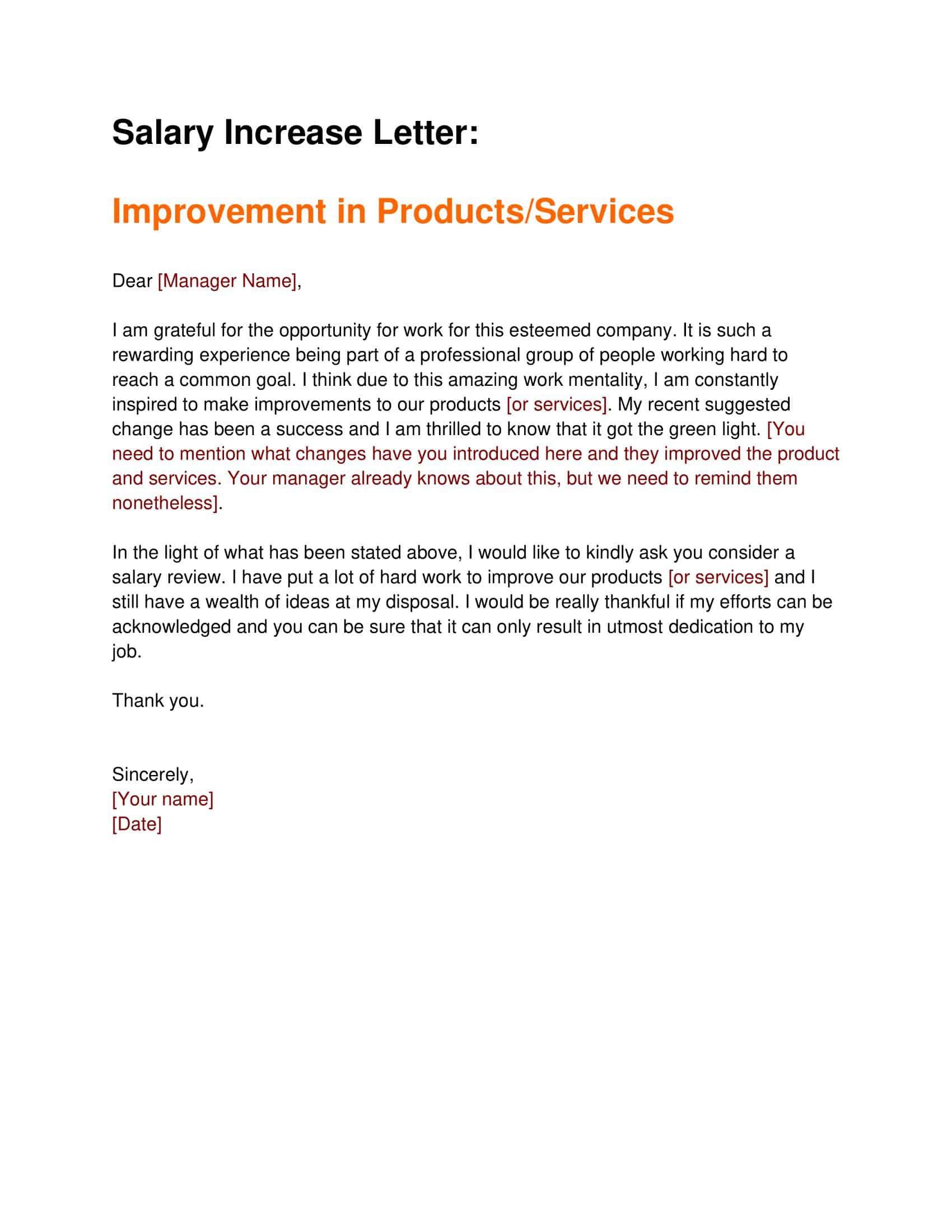
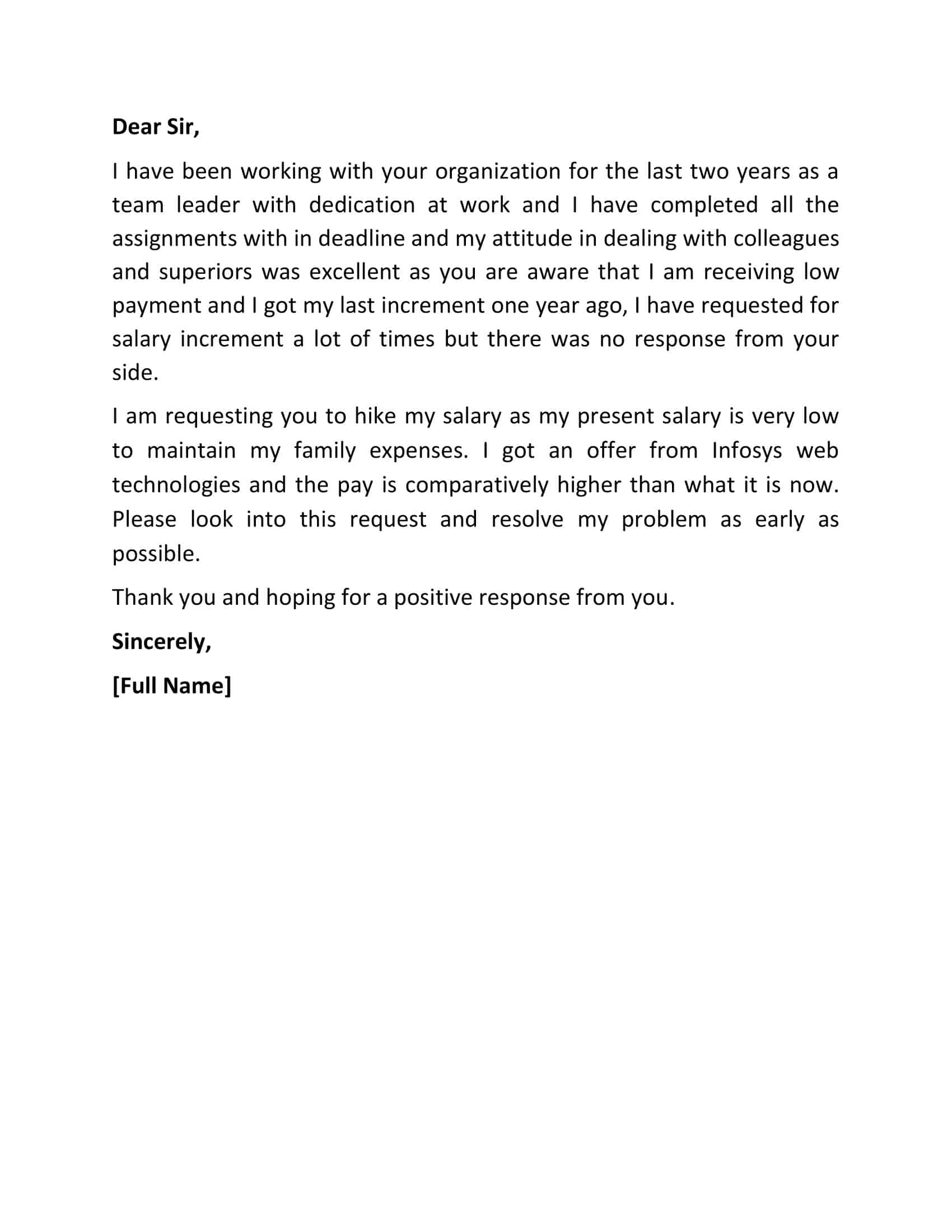














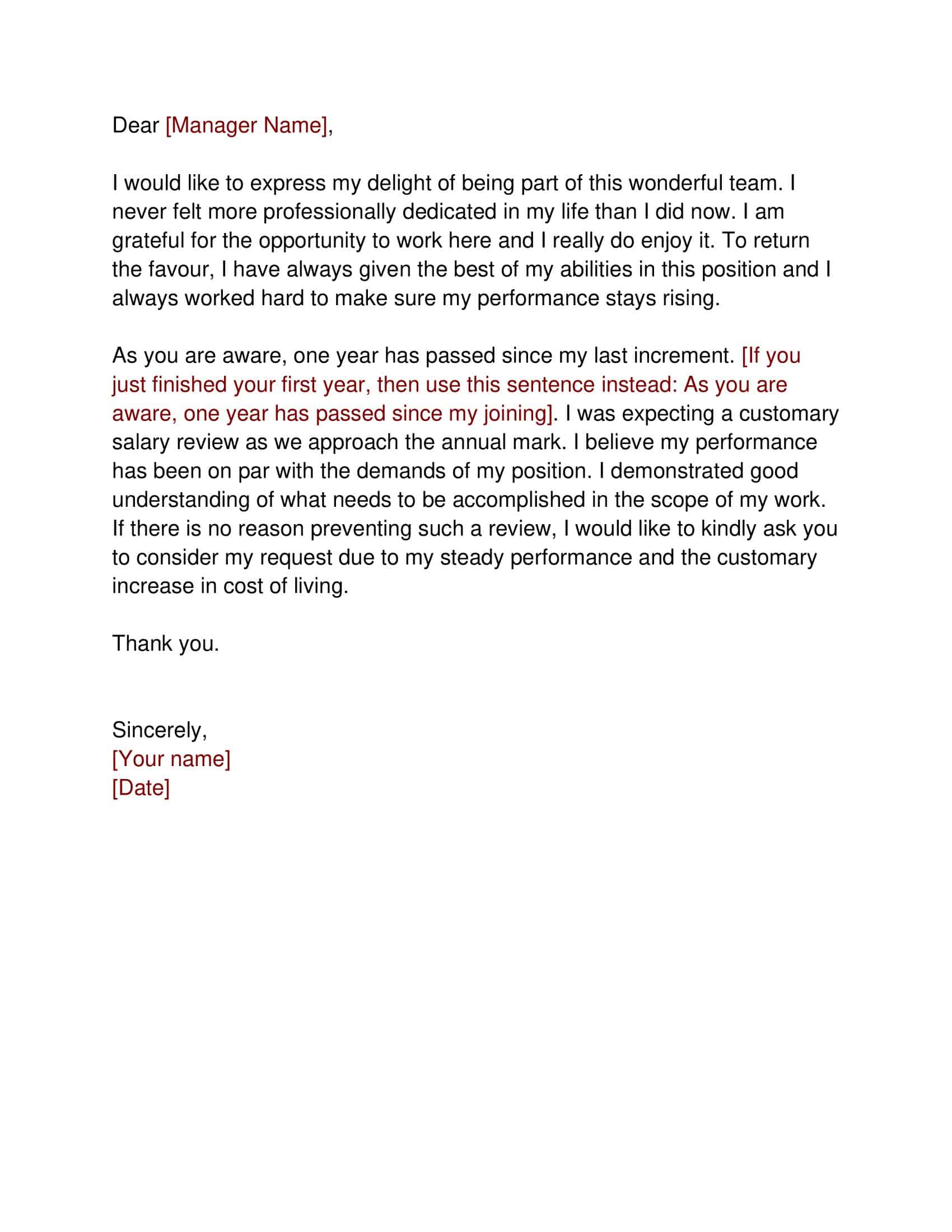
























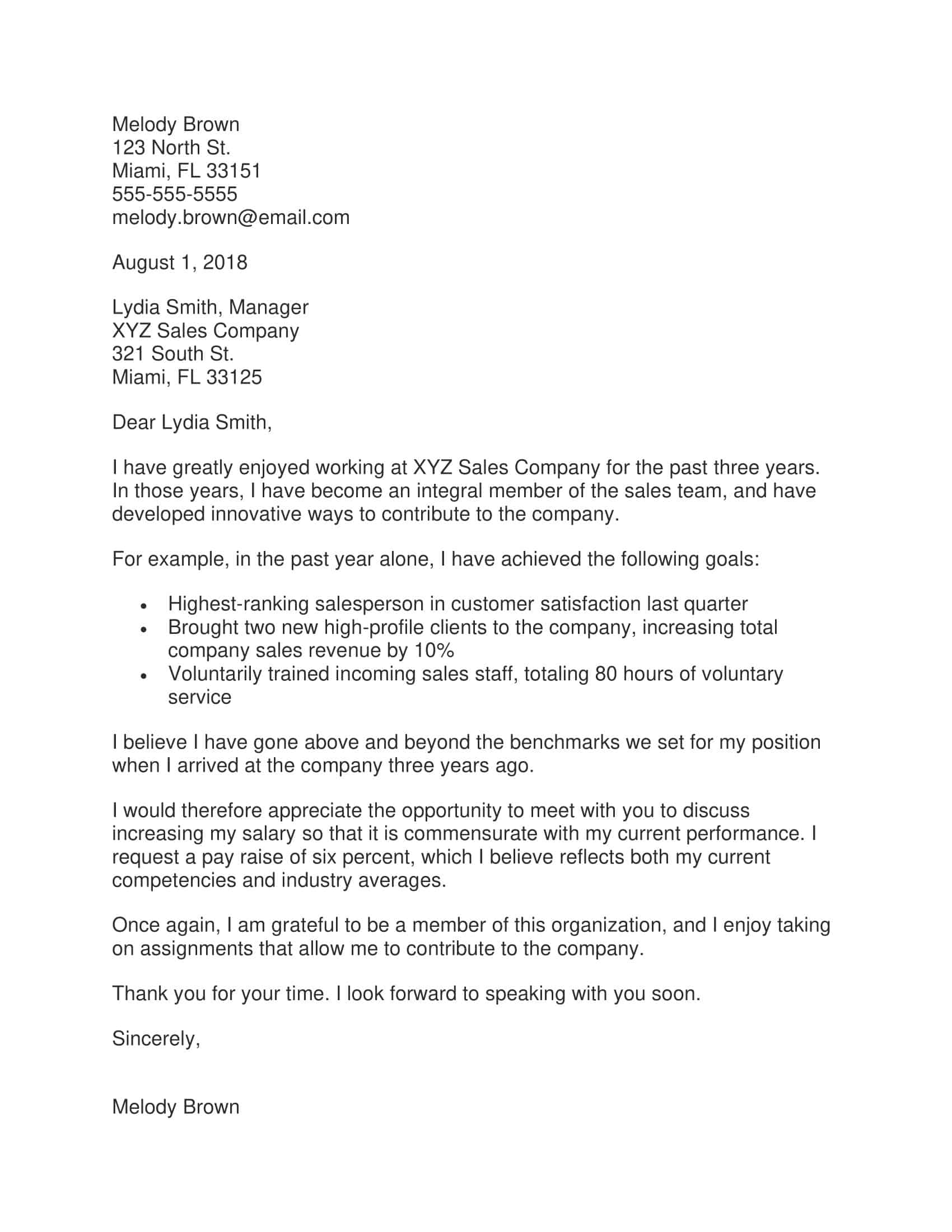

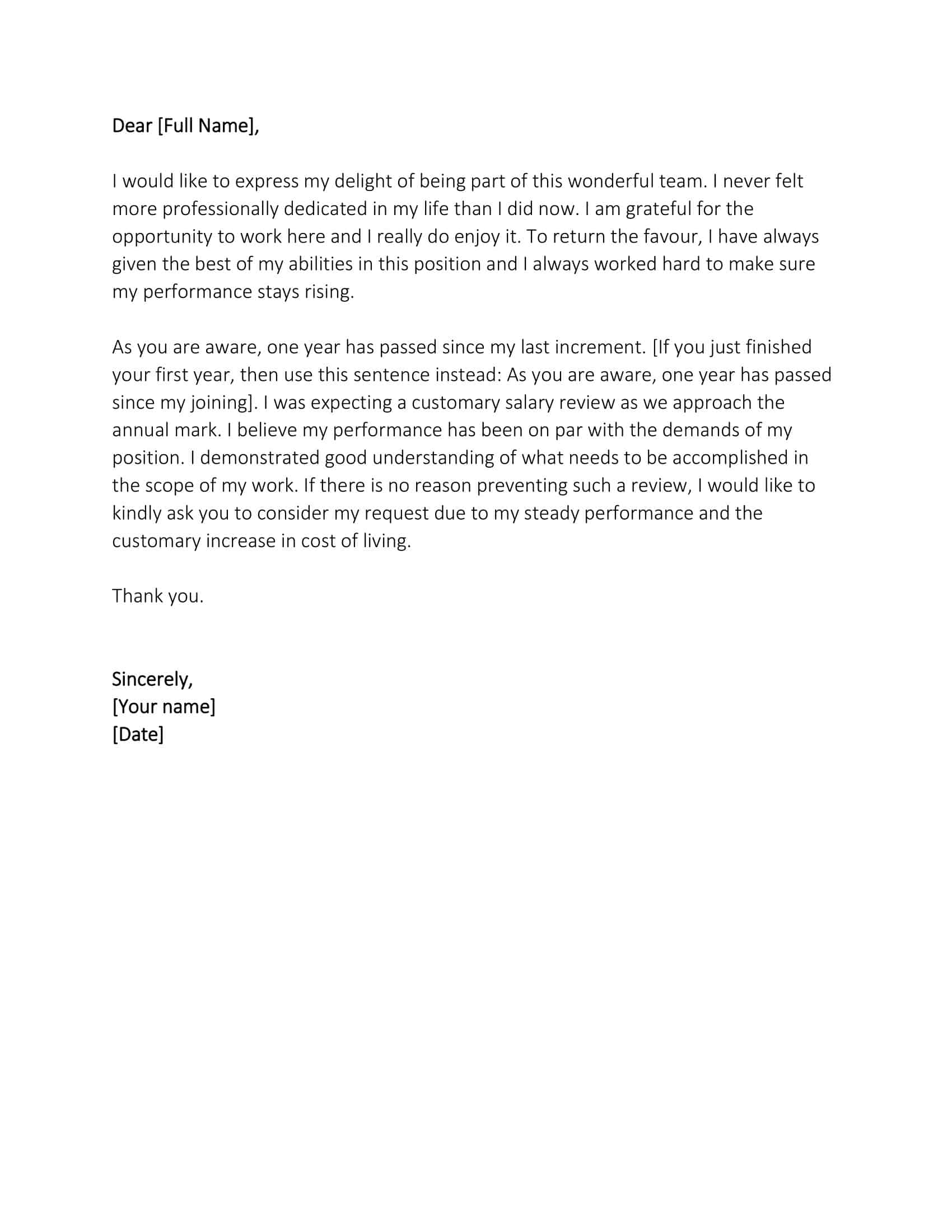






![Free Printable Friendly Letter Templates [PDF, Word, Excel] 1st, 2nd, 4th Grade 1 Friendly Letter](https://www.typecalendar.com/wp-content/uploads/2023/05/Friendly-Letter-150x150.jpg 150w, https://www.typecalendar.com/wp-content/uploads/2023/05/Friendly-Letter-1200x1200.jpg 1200w)
![Free Printable Congratulation Letter Templates [PDF, Word] Examples 2 Congratulation Letter](https://www.typecalendar.com/wp-content/uploads/2023/05/Congratulation-Letter-150x150.jpg 150w, https://www.typecalendar.com/wp-content/uploads/2023/05/Congratulation-Letter-1200x1200.jpg 1200w)
![Free Printable Salary Negotiation Letter Templates [After Job Offer] Example 3 Salary Negotiation Letter](https://www.typecalendar.com/wp-content/uploads/2023/04/Salary-Negotiation-Letter-150x150.jpg 150w, https://www.typecalendar.com/wp-content/uploads/2023/04/Salary-Negotiation-Letter-1200x1200.jpg 1200w)
